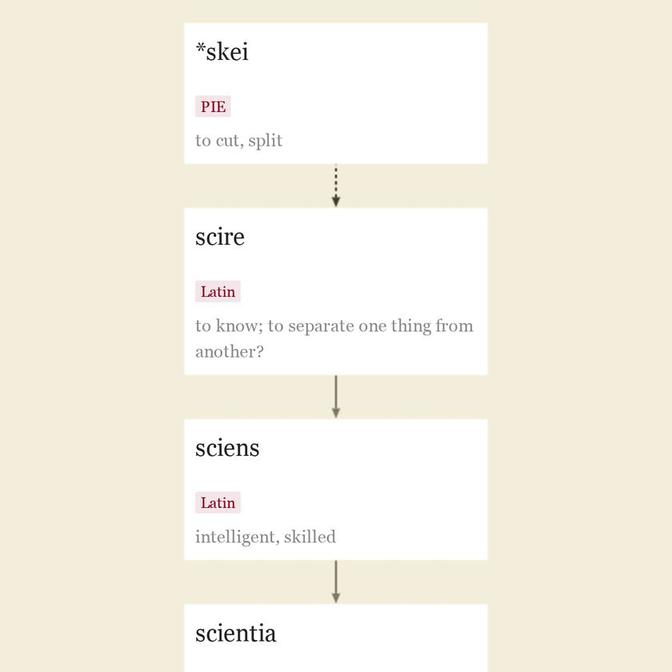scientific (adj.)
1580年代,“涉及通过观察和演绎获得准确和系统的原则知识”的意思,源自法语 scientifique,来自中世纪拉丁语 scientificus “关于科学的”,源自拉丁语 scientia “知识”(参见 science)+ -ficus “制造,做”,来自 facere 的组合形式“制造,做”(源自 PIE 根 *dhe- “设置,放置”)。最初,拉丁语单词用于翻译亚里士多德的《伦理学》中的希腊语 epistēmonikos “制造知识”。
到1670年代,“受科学原则指导的”,因此“有学问的,熟练的”; 到1722年,“关于,涉及或用于科学的”。到1794年,“根据科学规则”。
Sciential(15世纪中期, sciencial,“基于知识”,源自拉丁语 scientialis)是古典纯粹主义者基于 science 的形容词选择。 Scientic(1540年代)和 scient(15世纪后期,“有学问的”)也曾被使用。然而, Scientistic(1878)是贬义的,“假装有科学方法但不正确”。
短语 scientific revolution 表示“科学的快速和广泛发展”,可追溯至1803年; scientific method 可追溯至1835年; scientific notation 可追溯至1961年。相关: Scientifical; scientifically。
scientific 的相关词汇
*dhē-,原始印欧词根,意为“设定,放置”。
它构成以下词汇的全部或部分: abdomen; abscond; affair; affect(第一动词)“在心中留下印象”; affect(第二动词)“假装”; affection; amplify; anathema; antithesis; apothecary; artifact; artifice; beatific; benefice; beneficence; beneficial; benefit; bibliothec; bodega; boutique; certify; chafe; chauffeur; comfit; condiment; confection; confetti; counterfeit; deed; deem; deface; defeasance; defeat; defect; deficient; difficulty; dignify; discomfit; do(动词); doom; -dom; duma; edifice; edify; efface; effect; efficacious; efficient; epithet; facade; face; facet; facial; -facient; facile; facilitate; facsimile; fact; faction(名词1)“政党”; -faction; factitious; factitive; factor; factory; factotum; faculty; fashion; feasible; feat; feature; feckless; fetish; -fic; fordo; forfeit; -fy; gratify; hacienda; hypothecate; hypothesis; incondite; indeed; infect; justify; malefactor; malfeasance; manufacture; metathesis; misfeasance; modify; mollify; multifarious; notify; nullify; office; officinal; omnifarious; orifice; parenthesis; perfect; petrify; pluperfect; pontifex; prefect; prima facie; proficient; profit; prosthesis; prothesis; purdah; putrefy; qualify; rarefy; recondite; rectify; refectory; sacrifice; salmagundi; samadhi; satisfy; sconce; suffice; sufficient; surface; surfeit; synthesis; tay; ticking(名词); theco-; thematic; theme; thesis; verify。
它是以下词汇的假定来源/其存在的证据为:梵语 dadhati “放置,安排”; 阿维斯塔语 dadaiti “他放置”; 古波斯语 ada “他制造”; 赫梯语 dai- “放置”; 希腊语 tithenai “放置,设置,安置”; 拉丁语 facere “做,干; 执行; 带来”; 立陶宛语 dėti “放置”; 波兰语 dziać się “正在发生”; 俄语 delat' “做”; 古高地德语 tuon,德语 tun,古英语 don “做”。

14世纪中叶,“知道的状态或事实; 通过学习获得的知识; 信息; ”还有“知识的确信,确定性”,源自古法语 science “知识,学问,应用; 人类知识体系”(12世纪),源自拉丁语 scientia “知识,认识; 专业知识”,源自 sciens(属格 scientis)“聪明的,有技能的”, scire 的现在分词“知道”。
拉丁动词中最初的概念可能是“将一件事物与另一件事物分开,区分”,或者“切割”。这与 scindere “切割,分割”有关(源自 PIE 词根 *skei- “切割,分裂”; 希腊语 skhizein “分裂,撕裂”,哥特语 skaidan,,古英语 sceadan “分割,分离”)。
OED 写道,该词在英语中最早的意义现在仅限于神学和哲学。从14世纪末开始,它指的是“书本学问”,也指的是“特定的知识领域或学科,系统化的关于特定对象群的知识”; 还有“技能,聪明才智; 狡猾”。从约1400年开始,它指的是“经验性知识”; 还指“训练所得的技能,手艺; 一门行业”。
从14世纪末开始,它更具体的意义是“人类集体知识”,尤其是通过系统观察、实验和推理获得的知识。现代(限定的)意义上的“关于特定主题或推测的一系列常规或系统观察或命题”的概念可以追溯到1725年; 在17世纪至18世纪,这通常是 philosophy。
“非艺术学科”的意义可追溯到1670年代。通常理解的区别是希腊语 epistemē 的理论真理和实现实际结果的方法(tekhnē),但有时 science 用于实际应用, art 用于技能应用。
主要的现代用法,“自然和物理科学”,通常限于对物质宇宙及其规律现象的研究,可追溯到19世纪中叶。
The men who founded modern science had two merits which are not necessarily found together: Immense patience in observation, and great boldness in framing hypotheses. The second of these merits had belonged to the earliest Greek philosophers; the first existed, to a considerable degree, in the later astronomers of antiquity. But no one among the ancients, except perhaps Aristarchus, possessed both merits, and no one in the Middle Ages possessed either. [Bertrand Russell, "A History of Western Philosophy," 1945]
创立现代科学的人们具有两个不一定同时具备的优点:对观察的极大耐心和对假设的大胆。这两个优点早期的希腊哲学家拥有; 第一个优点在古代后期的天文学家中也存在相当程度; 但古代没有人同时具备这两个优点,中世纪也没有人具备其中任何一个。[伯特兰·罗素,《西方哲学史》,1945年]
Science, since people must do it, is a socially embedded activity. It progresses by hunch, vision, and intuition. Much of its change through time does not record a closer approach to absolute truth, but the alteration of cultural contexts that influence it so strongly. Facts are not pure and unsullied bits of information; culture also influences what we see and how we see it. Theories, moreover, are not inexorable inductions from facts. The most creative theories are often imaginative visions imposed upon facts; the source of imagination is also strongly cultural. [Stephen Jay Gould, introduction to "The Mismeasure of Man," 1981]
科学是一种社会嵌入的活动,因为人们必须进行科学研究。它通过直觉、视野和直觉来进步。它的变化往往不是接近绝对真理的结果,而是文化背景的改变对其产生了强烈影响。事实并不是纯粹而无瑕的信息碎片; 文化也影响我们看到事物的方式。此外,理论并不是从事实中不可避免地归纳出来的。最有创造力的理论往往是对事实施加的富有想象力的愿景; 想象力的源泉也在很大程度上受到文化的影响。[斯蒂芬·杰·古尔德,《人的错误测量》,1981年]
- prescientific
- pseudo-scientific